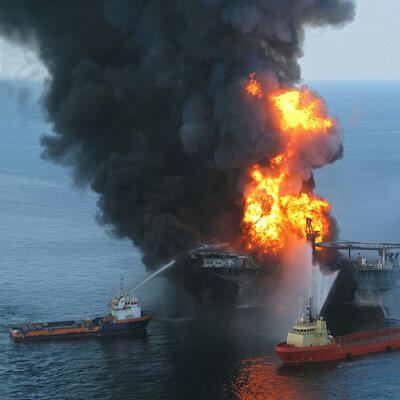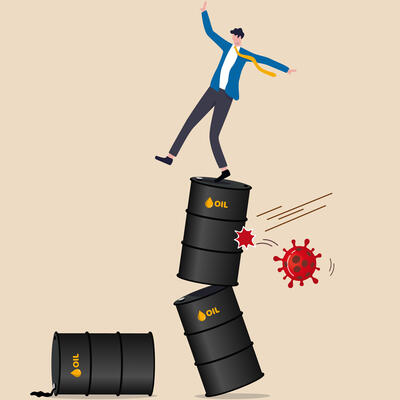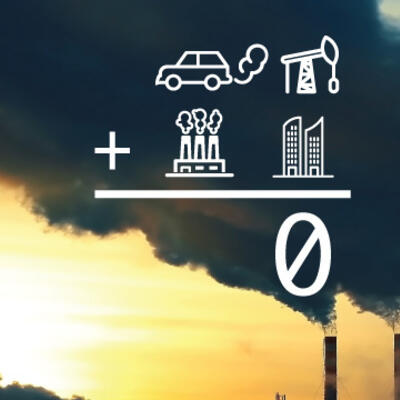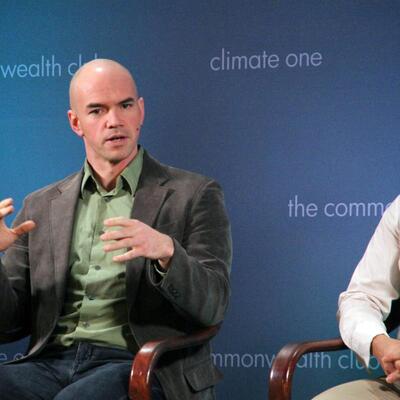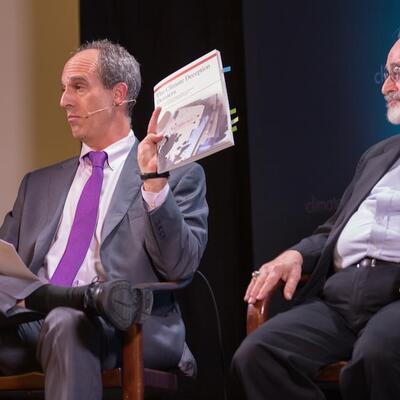
Cheap Gasoline
Guests

Jason Bordoff

Kate Gordon
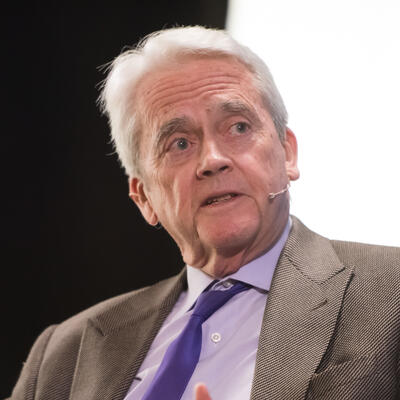
William K. Reilly
Summary
Gas prices are plunging, and Americans can get back on the road again. What are the economic, geopolitical and environmental consequences of cheap oil?
Jason Bordoff, Founding Director, Center on Global Energy Policy, Columbia University; Former Special Advisor to President Obama, National Security Council Staff
Kate Gordon, Senior VP and Director, Energy & Climate Program, Next Generation
Bill Reilly, Former Board Member, ConocoPhillips; Senior Advisor, TPG Capital
Full Transcript
Greg Dalton: This is Climate One, changing the conversation about America's energy, economy and environment. I'm Greg Dalton. And today, we're discussing cheap oil. Prices at the pump are a dollar less than they were a year ago. That is good news for drivers and bad news for oil companies. What does cheap gas mean for cleaner fuels? What does that mean for US energy security and geopolitics? Over the next hour we'll address those questions and explore the future of oil in a hot and crowded world. Joining our live audience at the Commonwealth Club in San Francisco, we're pleased to have with us three energy experts. Jason Bordoff is director of the Center on Global Energy Policy at Columbia University. He's a former special advisor to President Obama on the staff of the National Security Council. Kate Gordon is a senior policy advisor to Risky Business. A group focused on the business of risk of fossil fuels that is headed by billionaire Michael Bloomberg, former US Treasury Secretary Hank Paulson and Tom Steyer, a billionaire and climate advocate. And Bill Reilly is a former board member of the oil company ConocoPhillips. He was head of the US EPA under the first President Bush, and is now a Senior Advisor to TPG Capital, a private equity firm. Please welcome them to Climate One.
[Applause]
Greg Dalton: Thank you all for coming. Bill Reilly, ten years ago the consensus view in the US energy industry was that demand would go up and supply would go down for US fossil fuel production. What really happened?
Bill Reilly: My own view is that if you look at the world's energy situation, there are three demand areas; basically, the United States, Europe and China. And the projections were very different ten years ago for the future economies of two of those areas. Economies have slowed in both China and in Europe, and in the United States something has happened which I think is really very, very significant. It's never happened in my career before. It started happening about five years ago. We leveled off in terms of vehicle miles traveled. And Americans are driving fewer miles today. Now, there are more of us, there are more cars that are being sold and manufactured every day but at the same time we're driving less. I think that's a very significant and probably important continuing change in our economy. There are two reasons generally given for it. Well, the high gasoline price was thought to have something to do with it at the time, but it hasn't changed since the downturn. It has to do with what appear with the fact that lot of millennials are retiring and moving into cities and -- or rather, a lot of millennials are preferring to live in cities. And some of the baby boom generation are retiring and they're choosing cities and densely settled areas as well. That has profound consequences I think for the future. I would give a non-mainstream view about the future that I think is we're going to see a continuing reduction in demand.
In fact, if the 54 and a half mile per gallon requirement, fuel efficiency requirement is maintained, and I expect it will be, the analysis indicates that will reduce by more than two million barrels a day consumption in the United States. Similar things are happening in Europe. If you look then at the Chinese situation, they have a lot of shale gas. They haven't yet figured out how to develop it. It presents some other challenges that they're going to have to overcome. But if they dent even slightly for their economy, their demand for oil, what that portends is a reduction in demand that in the three major areas that now constitute the most of it. You can look at then the supply and realized that a lot of countries have shale gas that have not developed it yet, I think they will find ways to develop it. And once that happens, it's very possible that we could see a cascade of new supply at the same time as we see the decline in demand. And we will then I think see the oil price follow the gas price, the natural gas price in the United States, which is trending down.
Greg Dalton: So you think you it could still go lower than it already has, that some people think it might have bottomed out and be on the rebound. Boone Pickens thinks it's going to be back to 100 in eighteen months, but you think it could go further down?
Bill Reilly: You know it's really risky. You want to -- as a rule I've learned in public life, make the predictions that are that firm be for a period well beyond your own retirement.
[Laughter]
So for me, to predict the oil price, I think it's very possible that in 18 months -- here's currently a backlog of storage and supply. Once that's been worked off, I think you could see an uptick in the oil price in the maybe $75, $80 range. I guess I would have to say that I don't think it's going back to a $100.
Greg Dalton: Jason Bordoff, are we going to see --
Bill Reilly: People forget, people forget that as recently as the late 90s, it was in the single digits, a barrel of oil.
And then it was $20 I think as recently as the early 2000s, was it 2004? Somewhere in that range. So this is a cyclical commodity in terms of price and I supposed will continue to be.
Greg Dalton: Jason Bordoff, is oil going back to a $100?
Jason Bordoff: Not any time soon, you know. Will it ever? Probably, I mean directionally speaking the next barrel of oil you figure out how to pull out of ground is more difficult and more costly than the last one. And we see people going to extraordinary lengths as you know, well from your time at Conoco, everyone else going into the Arctic, going to the ultra-deep water pre-salt of Brazil. So these are costly barrels to extract. But I think for a variety of reasons, we kind of as Bill said got used to $110, $120 barrel oil as being the norm. That's actually historically, extraordinarily expensive. The average oil price over the last three to four years has been the highest it's ever been in history adjusted for inflation. Even today, the price of oil adjusted for inflation is historically pretty high. So again, it's hard to predict the price of oil but I think we won't be back at $100 any time soon. We'll probably be on this range of $60 to $80 for several years. But it's easy to see it dipping further before it comes back up. So could it go down to $30 or $40 before it comes back, I think that's definitely possible.
Greg Dalton: Jason Bordoff, there's one other change that happened the last ten years, this a big shift in US energy, global energy is that consumers have become producers and producers have become consumers. So sketch that out for us what that means.
Jason Bordoff: Yeah, I mean it's connected to what Bill was talking about. It is a pretty -- we're seeing really historic shifts for people who spend their time thinking about energy the way we do, the way many of you do. This is a, you know, I think the next Dan Yergin who writes the next book on energy history will look at this moment in time as a really transformational one in a lot of ways. One is obviously what's happening with the cost of renewables and the potential climate impacts we need to deal with.
But the other is what's happening in the oil and gas market globally. So if you -- Bill was talking about demand from the US or Europe or China. If you look at, notwithstanding the downturn and the flattening of demand we've had here. If you look at all the projections for oil demand looking out into the future, you know, it's on the range of 800,000 to a million barrels per day, per year increase as far as the eye can see. That I can easily see a scenario where that ends up being lower, where we dramatically reduce oil demand but if you look at oil demand in the Middle East. The CEO of Saudi Aramco recently said on its current trajectory by 2030, the Saudis will not export oil if you look at the internal growth rate of demand for oil within that country.
Greg Dalton: Wow, that's big, that's really big huh?
Jason Bordoff: Yeah. So Middle East has rapidly growing demand for oil. If you look at Latin American countries, they have rapidly growing demand for oil. So the places we thought of as the producers of oil, the Middle East, Venezuela, these are rapidly growing demand centers. Africa and obviously Nigeria is a major producer. If we accelerate rates of economic growth, pull hundreds of millions or a billion more people out of poverty as I hope we can, that has huge impacts on demand for energy. At the same time, the places that we thought of as being the major consumers of energy, and the US by far is, you know, the leader on this but Canada too and some other places, are now where the vast majority of the supply growth has come from over the last several years. US oil production is up four million barrels a day since 2008 I think. That's a staggering turnaround in US oil production. We consume -- oil imports have gone from 60% to 20% of our consumption. So when we think about what has offset the disruptions we've seen around the world, the sanctions against Iran, the Libyan civil war, even though prices were over a hundred, the reason they didn't spike over 150 or 170 was because the US more than made up that lost supply.
Greg Dalton: Kate Gordon, are these low oil prices hearing that they are high historically but they're low adjusted for inflation but low relative to recent years -- are they good news or bad news for people who think we’ve got to get off fossil fuels because of the climate imperative?
Kate Gordon: You know it's a good question. I think obviously would agree with Bill that we would all be crazy to predict what will happen with these prices. But the one thing that is predictable in oil markets is that they're volatile. And we will see unpredictability going forward. And we'll see that because of a range of things, it's not just about production and demand. It's also as we know from Katrina about extreme events. It's about political instability, there's a number of things that affect these markets. So for consumers I think the key is to keep our eye on -- and policy makers, our eye on reducing vulnerability to that kind of volatility. Doing that through reducing vehicle miles traveled, that's absolutely happening in the US where I think car sharing is actually a big piece of that. Los Angeles reduced its VMT, vehicle miles traveled, by 8% and I think that's mostly due to car sharing in LA which is the car capital right? But we're also seeing unfortunately the new low prices lead to a surge in demand for SUVs again so, and vehicles that use more gas. The key to me for policy makers and consumers is keeping our eyes on policies that do reduce that vulnerability to volatility. So whether that's pushing electric vehicles, trying to move the vehicle fleet more into electricity side, which has become far more renewable. Whether it's getting upgrades to vehicles that are newer and more efficient, that's the whole cash for clunkers thing. I think we should not take that off the table. There's lots of people especially here in California driving 25-year or older cars which are huge smog contributors as well as being incredibly inefficient. So thinking about those transitions to new models of driving and to getting ourselves away from this model of having one kind of engine and one kind of fuel is incredibly important.
Greg Dalton: Overall for the US economy Bill Reilly, low gas prices put cash in the pockets of American consumers and drivers, and a lot of other industries except for the oil industry benefit from this, isn't that right?
Bill Reilly: No question about it. It's very good for the country. Not just the low gasoline price, which you can argue presents opportunities that we would be very wise to take to increase federal taxes, to pay for infrastructure and pay for roads among other things and bridges very directly related to automobiles and their traffic. But the reduction in oil price generally is a marvelous boon. I think it adds something like $40 billion to our GDP. And there's so many industries which are benefitting from it. One thinks of -- well, chemicals, some which are returning from Europe and other countries, this is actually a concern of European policy makers that they're losing some of their edge in terms of competitiveness because of the raw materials that chemical companies depend on to this proportion amount being oil. The aluminum industry, anything that involves travel, which is recreational industries that have recreational parks say, Disney and the rest, or the cruise industry, you can just go straight through them. An interesting phenomenon though about the cruise industry -- I’m particularly familiar with this -- that although a large part of their expense is fuel, they give back a certain amount of it if they're getting a lot of foreign revenues. The reason for that is the strength of the dollar. And the things that the dollar is owed to the decrease and you know oil price into our own production here at home. So for every hundred dollars it saves in fuel price, probably 30 or so is given back in terms of the higher foreign exchange consequences, which is interesting.
It's a very complicated kind of interconnected set of realities that depend upon oil. But oil is such a fundamental commodity in so many industries and so many areas of life that yes, the reduction in cost, it definitely has some undesirable consequences for some industries. And Texas for example, got $15 billion in receipts for its schools and for the public from its oil taxes last year. Five or six years ago when the oil price was down around I think twenty, it got just little more than half of that. So there are those consequences. Alaska is another state that will suffer from this depressed price. But by and large it's a very positive thing.
Greg Dalton: Jason Bordoff, will car makers move away from gas sipping cars and start -- are we going to see the return of the Hummer?
Jason Bordoff: Well, probably not the Hummer. But carmakers respond to consumer demand. So if consumers decide that, you know, cheaper gasoline is here to stay for whatever because we’ve forgotten that it goes up and down a lot and it's probably going to go up and down again, they'll respond to that. So I think there'll be some of that. Look I think, all the benefits Bill talked about, I completely I agree with. There are a host of geopolitical benefits I'm sure we'll talk about. From an oil demand and emission standpoint, lower prices are not a good thing. So people respond to demand and on the margin, you're going to consume a little bit more. You're going to drive a little bit more, maybe make a different choice about what kind of car you would buy. That's why I think policy is so important. And I think what prevents us from returning to the Hummer is the fact that we have aggressive fuel economy standards. And hopefully in the mid-term review we stick to them in the US. And then obviously, you know, other countries are some, not all, moving forward with their own efforts to reduce oil demand. But policy is going to be the key driver.
Greg Dalton: Kate Gordon, one of the reasons that US supply has demand -- has expanded is fracking. Environmentalists hate it; business thinks it's been a boon. Has fracking been good for America under driving the way we've been talking about?
Kate Gordon: I'm actually going to answer -- I'm going to respond to Jason before answering that --
Jason Bordoff: If your answer was yes.
Kate Gordon: No, I'm just going to respond to Jason first and just say just a point on the vehicle, the answer which is something I think doesn't get seen a lot. Which is there are equity issues with even with the fuel -- with the way people buy vehicles. One interesting thing we see here in California is the secondary vehicle market. When people are buying more efficient vehicles who change over their vehicles a lot, the secondary vehicle market tends to be less efficient. So the vehicles available to people who are lower income and buy off of used car markets then become all of the inefficient vehicles. So it's sort of an interesting side thing that tends to happen is that you'll see people switching to more efficient vehicles and then all of the secondary vehicles available become less efficient. And then the people driving them have less ability to pay their gas bills. So it’s just one thing that we don't think about as much because the secondary vehicle market are not tracked very well.
On the fracking point, I think fracking is an incredibly complicated issue. I think it's -- I actually don't necessarily trust anyone who has a pat answer to that question. It's, we've been doing hydraulic fracturing in California for a very long time. We've just added it to horizontal drilling recently, that's the new innovation. And there are people on one side, I mean there are issues with doing that through sensitive aquifers, especially in California where we have drought conditions. And we cannot afford our aquifers to get contaminated with chemicals. On the other hand, there's very good science to show that it's possible to contain those chemicals and not have them leak into the aquifers. So, I think it's a complex issue, it's very regionally specific. What fracking means in Pennsylvania is very different than what it means in California. I think it's a complex issue and I don't, I honestly don't think there's just one answer to it. I know that sounds like a hedge but I think it's tough. I do think given that fracking happens often through aquifers and in geologically sensitive areas of California in particular, I do think that we should be pushing for the most stringent policies possible to contain methane and contain those chemicals. Wellhead reinforcing the concrete at the wells, doing reinforcement on the pipelines and not doing fracking in areas that are incredibly geologically sensitive. I think that's just good practice.
Greg Dalton: Bill Reilly, would you want fracking near your home?
Bill Reilly: No. No, I think fracking has the disadvantage and that typically it does result in a certain amount of industrialization often in remote areas, countrysides.
Greg Dalton: Beautiful rural America.
Bill Reilly: Yes, if that's what -- and I think I would respect local option on some of these things. But no, I think it has tradeoffs. But they’re the tradeoffs associated with development growth generally is what they are. So, and Kate’s right, it’s been going on for a long, long time. Natural gas wells have not been controversial until the technique became better known and the production and the impact in North Dakota and other states. And also I would say the unfamiliarity of people in Pennsylvania and New York to this mode of activity, maybe even Southern Ohio, that and the profits to be made I think led a lot of people who really didn’t know what they’re doing to start doing fracking. So you had contamination of water bodies, of rivers, reservoirs and things of that sort. Many of the major oil company people were contemptuous of that because they said this is not -- it’s not difficult to sink. They do it every day, to sink a well down that has no invasion, no consequence, no involvement with the aquifer and the gas is typically in oil well below the aquifer. But one other thing I would say, and we, I think as environmentalists, should take it into account. The President made a commitment to reduce by 17% our greenhouse gases.
He made that commitment at Copenhagen and by 2020 and we're on track to do that. We’re up at 12 or 13 something I think. The reason for that is thanks to fracking. People don’t like to hear it, but it’s the fracking that has produced the tight oil and that has some given us some of these alternatives to coal-fired power and we’ve seen so much decline in the way of commitments to take coal-fired power plants out of action and to replace them with gas-fired power which is, from point of view of emissions, a great improvement. The oil and gas industry is really what developed the technology to allow that to be possible.
Greg Dalton: Bill Reilly is a former head of the US EPA. Our other guests today at Climate One are Kate Gordon from the Risky Business Project and Jason Bordoff from Columbia University. I’m Greg Dalton. Jason Bordoff let’s talk about the geopolitics of the low oil prices. How has that affected the geopolitics of oil with respect to Russia, Iran and US interest?
Jason Bordoff: Yeah, it’s really quite significant. I sort of talked before about this dramatic shift we've seen. Let me give two examples. We talked about the enormous increase in US oil production, 4 million barrels a day, and the question is what does that mean? People will recall, maybe, that after World War II the US was the swing supplier in the global oil market, we were the balancer, right? Texas Railroad Commission artificially restrained oil production and they didn’t allow the country to produce as much as it can to prevent price spikes so we could put more oil on the market if we needed to. Over time consumption went up, we suburbanized, for a host of other reasons and we kept importing more and more oil and by March 1971 for the first time in history they lifted the quotas and they said go and produce as much as you can, and then two years later the Arab oil embargo happens and then OPEC and most recently mostly Saudi Arabia have held that mantle.
They have been the places with swing spare capacity, the ability to put more oil on the market or the willingness to hold oil off the market that they could otherwise have sold. And that’s given them a huge amount of leverage in the global oil market. The oil price started to decline last year. People thought that OPEC, again the Saudis, would respond by pulling supply back to prop the price up and on November of last year they had a meeting and they said no, we’re not going to do that anymore, we’re going to let the price fall. We’re going to let the market balance. We’re really cheap producers, why should we not sell our oil? We’re going to let the price fall and we’re going to let higher cost producers like - some people thought it might be like the US but maybe like other countries Canada, Russia elsewhere -- we’ll let them cut back production because it doesn't make economic sense. It turns out that whatever people thought the breakeven price of US shale oil was a year ago, it's actually much lower than people thought. US oil production is going to continue growth, not as quickly, but continue to grow even at lower prices. And that means over time the market comes into balance with other countries, high-cost producers like someone of the ones I mentioned cutting production. And shale oil is different than conventional oil because it is very responsive. It goes offline really quickly for reasons we can talk about, and it comes back online really quickly. So that means, potentially, that as the price starts to rebound the US supply comes back very quickly and now the US supply -- the economics of US shale, are setting a soft floor of the world price rather than OPEC. That’s a historic shift. We’re going to learn over the next few years if what I just said is true, but that is well very plausible, I think. What it means for other countries like, you know we can talk about each one of these for a while, but Russia combined with sanctions the low oil price has meant that the ruble has fallen by half. We’ve had about 150 billion dollars of capital flight from the country, severe economic pressure on that country whether it brings Putin to the negotiating table and to pull back aggressive actions in Ukraine remains to be seen.
We see unfortunately things going in the opposite direction. And I think countries like Venezuela and Nigeria don't get talked about enough because of what the oil price collapse could mean for real chaos in most countries, the potential, Venezuela was already in an economic downward spiral and the ability for the lost oil revenue to mean that that country really falls into economic collapse, same with Nigeria and what the spillover effects would be for Venezuela’s support of fuel subsidies and Petrocaribe program through the Caribbean or Nigeria's ability to fight the Boko Haram and terrorism. There could be a lot of worrisome spillover effects as a result of the oil price collapse.
Greg Dalton: Does it strengthen the US hand with regard to Iran?
Jason Bordoff: Potentially, and I think the oil boom we saw in the US, and I was in the administration when we were implementing sanctions against Iran, when I think the sanctions were more effective than many people thought they would be at the time at actually pulling oil off the market. Iran is selling a million, a million and half barrels a day less oil than it otherwise would. Oil is really a fungible commodity. It’s easy to sneak its way into the world black market and part of the reason it was affective was not just because of the threat of sanctions but because of aggressive diplomacy on the part of the US and others to persuade purchasers of Iranian oil like China and India to stop purchasing Iranian oil and purchase other oil instead. And the fact that you could go to them and say you're not going to pay an economic penalty for doing that because we’re going to pull all this Iranian supply off the market but the US alone is going to more than make up the lost supply, actually made those negotiations much easier I think. The question now is in a low price environment does it make Iran more likely to come to the negotiating table in June at the next P5+1 negotiations and agree to, you know, dismantle their nuclear program, that's a much tougher question. I think the impact of the oil price drop on Iran has been less severe than on some other countries only because they've had two or three years where many of these effects have already been felt as they’ve had their oil sales already scaled back.
So it still has hurt them quite a bit but, you know, there's a lot of factors that are going to determine whether they're willing to get out from their nuclear program.
Greg Dalton: Bill Reilly, Cuba’s about to open up, are we going to see an oil boom in Cuba? There's a lot of oil in Cuba?
Bill Reilly: Well the Cubans certainly hope that there will be. They have every reason to develop their offshore oil and gas. They get about half of what they need from Venezuela. That’s an increasingly unreliable partner and supplier as Jason has implied. I think that Cuba has to be very careful in how it develops its offshore oil. They don't have any experience with it. They drilled three holes, unsuccessfully, dry holes so far, and one of them is 18,000 feet, you know, this is significantly deeper even than Macondo, the BP well that blew out in 2011 causing so much damage in the Gulf. They also it would seem to me ought to have a significant capacity for renewables. They’re a very sunny country. It’s a place that doesn't have a great demand for electrical energy right now. It's going to go up presumably if they do begin to industrialize and develop their economy once relations with the outside world, principally the United States, do in fact begin. And I would hope that they could learn from some of the experiences in the United States, in Nevada, in California, now in Texas, where you have utility-grade solar that provides very substantial amount of electrical energy and we’re not just talking small amounts anymore. I think Austin, Texas is getting something like 200 and some megawatts that it’s committing for I think one assumes reports of 20 years at least down into the future. This is going to make a huge difference to places like Cuba if they’re able to do the contracts, bring it on.
They’ve not been very good about having contracts with outside companies because they insist on hiring all of the employees in Cuba of those companies. They typically pay $20 a month. That’s I think, something like 75 to 80% of Cubans who work do in fact get those kinds of salaries. They’re supplemented, obviously, by health and education and all the rest of the benefits that they have but this is not a modern functioning economy by any means and they have so many needs. They import the grain necessary for chickens. They don't have enough grain. They import the grain from Illinois and Indiana. They import the chickens from Arkansas. And in fact there is more interpenetration of their economy with the United States economy than one imagines. But one can only hope that gradually we will see them begin to enjoy some of the benefits that industrialized countries have and one of those in the Gulf is that, if not in Cuban waters certainly very nearby, there are very substantial reserves of oil.
Greg Dalton: We’re talking about the future oil and gasoline at Climate One. We’ll be right back after this break.
[Applause]
Announcer: And now, a Climate One Minute.
With gas prices so low these days, it’s easy to forget the hard times. In 2008, oil hit $147 a barrel and Americans were paying nearly five dollars a gallon at the pump.
When former CIA director Jim Woolsey was our guest in 2013, he suggested that breaking the oil cartel was a matter of giving drivers a choice of recipes:
[CLIP]
Jim Woolsey: Suppose Britain or the United States had policies as sound as those of Brazil, China and Israel, so that you could pull in to a filling station and choose there what you wanted to drive on. You didn't have to get permission from any bureaucracy. You didn't have to get permission from a cartel like the one that runs the oil market now, OPEC, you just chose and you drove off.
In Brazil, it's ethanol because sugar cane is great down there and it all fits. The Israelis are moving toward their second fuel being methanol with an M, in other words, cleaning fluid not rotgut whisky. Those countries are starting to make it possible to pull into a filling station and decide what you want to buy. And what they're finding is that cleaning fluid, methanol with an M, is a good deal cheaper and seems to drive cars just as well as gasoline.
Announcer: That was Jim Woolsey, CIA director under President Clinton, speaking with Climate One in 2013. This has been a Climate One Minute – now back to Greg Dalton and our live audience at The Commonwealth Club.
Greg Dalton: We’re back at Climate One, time for our lightning round. We’re going to ask each of our guests today a yes or no question, series of yes or no questions and then we’re going to ask them to complete a sentence. Kate Gordon, Republicans have achieved more environmental protection over the past 50 years than Democrats, yes or no?
Kate Gordon: Yes.
Greg Dalton: Bill Reilly?
Bill Reilly: Yes.
Greg Dalton: Jason Bordoff?
Bill Reilly: Come on Jason.
Greg Dalton: Republicans have achieved more environmental protection over the last 50 years the Democrats. We know you worked for a Democratic president, but yes or no?
Jason Bordoff: I don’t know the answer that firmly enough to say, but I mean there's good reason to think the answer might be yes but I’m not sure.
Greg Dalton: I was thinking about President Nixon creating the EPA, Clean Water Act; President Reagan doing the Montréal protocol; first President Bush doing the first cap and trade program. Next question, the climate impact of the Keystone pipeline is exaggerated by its opponents? Jason Bordoff?
Jason Bordoff: Yes.
Bill Reilly: Yes.
Greg Dalton: Kate Gordon? None of your environmentalist friends are in the room, so you can tell us.
Kate Gordon: Exaggerated by opponents, is that what you’re saying?
Greg Dalton: Correct - the climate impact of the Keystone pipeline is exaggerated by its opponents.
Kate Gordon: Yes.
Greg Dalton: In 2009, a bill passed through the house under the leadership of Nancy Pelosi to put a price on carbon pollution. It was a Cap and Trade bill, it died in the Senate. Bill Reilly, President Obama could have pushed a climate bill through Congress in 2009 if he really tried. Yes or no.
Bill Reilly: Not and also probably won health care reform.
Greg Dalton: It’s a no. Kate Gordon? Could have Obama gotten a deal in 2009?
Kate Gordon: The President is not the only person who gets these deals. I don't think the conditions were right for a deal.
Greg Dalton: Jason Bordoff?
Jason Bordoff: I think the administration tried. It was very difficult.
Greg Dalton: I would like you to ask -- to complete these two sentences, just the first word that comes to your mind. Kate Gordon, Republicans who publicly deny climate disruption and privately acknowledge it are what?
Kate Gordon: Scared.
Greg Dalton: Bill Reilly?
Bill Reilly: Responding to constituency pressures.
Kate Gordon: That is not one word.
[Laughter]
Bill Reilly: Democrats. In the small.
Greg Dalton: Jason Bordoff, Republicans who publicly deny climate disruption and privately acknowledge it are?
Jason Bordoff: Not being courageous.
Greg Dalton: Cowards, okay.
[Laughter]
Greg Dalton: Bill Reilly, climate advocates who make apocalyptic predictions are what?
Bill Reilly: Unhelpful.
Greg Dalton: Jason Bordoff?
Jason Bordoff: Understandable but not as constructive as they could be.
Greg Dalton: Understandable. Kate Gordon?
Bill Reilly: You never get one word out of an academic.
[Laughter]
Greg Dalton: He's a professor, he's wired for -- yes. Kate Gordon, climate advocates who make apocalyptic predictions are?
Kate Gordon: This isn’t going to be one word either but --
Greg Dalton: Hyphenate. You can get two if you hyphenate.
Kate Gordon: I’m going to do a Bill Reilly answer, a longer answer. Winning the battle but losing the war.
Greg Dalton: My answer is depressed, but okay. That’s it for our --
Kate Gordon: And just making themselves more depressed by having apocalyptic predictions.
Greg Dalton: -- our lighting round. Bill Reilly, ConocoPhillips you were on the board of that oil company, has pulled away from the Canadian tar sands. Do you think that the lower oil prices are going to keep some of the tar sands in the ground?
Bill Reilly: I think they're likely to slow the rate of expansion of oil sands. I don't think they're going to block it because the opportunities frankly are so much better in the Permian and the Bakken and the Eagle Ford Shale place in the lower 48. The lifting costs are vastly less, and in a lower price environment. That and the oil sands and also I would say the offshore Arctic are much less attractive from an economic point of view.
Greg Dalton: Jason Bordoff, are those people --
Jason Bordoff: Is this supposed to be a one word answer?
Greg Dalton: No, no. We’re back to -- Jason Bordoff, are those climate people who think that one of the upsides of cheap gas which makes it easier to drive more will keep the dirty tar sands in the ground. Is that just a temporary thing or is that a longer-term thing?
Jason Bordoff: No, it’s a temporary thing. I mean, the oil sands resource is an enormous one and over time if oil demand continues to grow, you know, that supply is going to come from lots of places including from Canada. We've seen a tremendous boom in the movement of oil by rail in the United States, which worries me from a safety perspective, and there are a lot of ways to get oil to market by pipeline or trains or barges or trucks or other things. It probably, you know, may not be as developed as quickly. It may get pushed back a little bit, you know, but over time that resource there unless policy takes us toward a different place, unless it reduces demand, unless it puts a price on carbon, and I do actually want to amend the answer I gave before when you asked if Republicans have done more than Democrats. Yes you have the Clean Air Act and the Montreal Protocol but I think it’s important to look at the net impact not the gross impact of any particular policy. And so the efforts from the Republican Party to push back against efforts to put a price on carbon or put in place meaningful climate policy. If you look at the net impact of the efforts by the Republicans versus the Democrats, then no, I think the Democrats end up in a better place.
Bill Reilly: I think your job in a future Democratic administration is secure.
[Laughter]
Greg Dalton: But Bill Reilly, you would agree because the Republican Party of the Nixon era is not the Republican Party of this current era and the Republicans today have pushed back on environmental regulations, saying that they kill jobs, hurt the economy, and you have a different view.
Bill Reilly: I do have a different view. I would say first of all that it needs to be acknowledged -- there's a tendency, I think, in the environmental community to assume that it's all the Koch brothers and money that explains these policies.
I think we all know members of Congress who as you offered a little while ago believe in climate change, understand the science, but are not supporting -- didn’t support Cap and Trade and wouldn’t support a carbon tax for reasons of constituency concerns and pressure. I can think of several where that's true and it doesn't have anything to do with money. These are established members of Congress who have plenty of money to run in their primaries irrespective of where they stand on climate. But constituency pressures do explain some of it. I take a lot of encouragement from the fact that 15 Republican United States senators did recently vote to recognize, affirm, that humans are impacting on the climate. I think that's the kind of breakout that’s very helpful to us.
I would go a little further; I wouldn't say that resistance to a carbon tax is a Republican or Democratic priority. I’d be surprised if you could get a majority of Democratic senators to vote for a carbon tax in the United States. I think that it’s going to take a lot more analysis and judgment that other alternatives to raise revenues are less desirable and that a carbon tax in some form is the least bad alternative before we’re going to see a reasonable majority in both houses begin to take it seriously. There are people I respect in Washington who think that day may come. I’m doubtful it will come any time soon, but I think it would be a very productive thing for the climate. I think it would be, frankly -- having been one of the authors of Cap and Trade for the sulfur dioxides program in the amendments of 1990, I think that a carbon tax is a more efficient way to deal with that economically than Cap and Trade would be.
It is also the precedent and Cap and Trade went down in Congress and so let's try something else, and in the context of tax reform, which the President and leading Republicans have said they are for, the details obviously will divide them but we may get -- it could be something that I think could be targeted to, along with returning the revenues to an equivalent amount to the taxpayers, could help pay for infrastructure and things that we can get in a much more substantial population of our representatives support.
Greg Dalton: When some people hear Exxon Mobil and other oil companies support a carbon tax they have a little bit of a cynical reaction. Those companies say they support it publicly but they have lobbyists inside Washington who are doing everything they can, Jason Bordoff, to slow it down. Are they playing a double inside and public game?
Jason Bordoff: There's a lot of variants in the oil and gas industry, so I think companies are in different places on this. I think that there are many energy companies that are not supportive of increasing environmental regulations or putting in place rules like EPA rules, power plant rules or other things to deal with emissions from the power sector. I do think that there is, at least among parts of the oil and gas industry, some recognition that we can’t just be against everything but we actually need to start thinking about how to be for something. And relative to lots of alternatives if we think that policies are coming on climate change, putting a price on carbon is the most cost-effective, the most efficient, the most direct way to do this. And actually we’ll be open and receptive to like really having a conversation about putting a price on carbon.
Greg Dalton: The CEO of Shell Oil said that recently the oil companies are not particularly credible if they’re against everything. Bill Reilly, you said recently that Texas is where China was 10 years ago in terms of -- what did you mean by that?
Bill Reilly: Well, I have long been an advisor to the energy project of the energy foundation in China, China’s sustainable energy program is what it’s used to be called. And for so many years of going to an annual exchange with senior leaders of the government of China, one was cautioned not to use the word climate change or global warming. Because if you did, and I twice did, you got the spiel, you got a 15 to 20 minute peroration about how the problem had been caused by the developed countries, most notably the United States, and it should be on us to resolve the problem that was being inflicted on the rest the world and so forth. However, the Chinese were extremely interested in getting help of experts on energy efficiency, on how to make a ton of steel for the same amount that it costs the Japanese because it cost about 50% more in those years for them to make a ton of steel in China. And a whole range of industries where they wanted to get the benefits of modern technology and at the same time have the effect of reducing their pollution, which is a very serious and has been a growing problem in China, including carbon dioxide. Carbon dioxide was not at that time the focus of those efforts but it was a byproduct of energy efficiency improvements. Well, some years ago I was associated with an investment in Texas with a purchase of the major public utility, the largest public utility in Texas and I remember being cautioned in explaining it something along the same lines. Texans by and large don't want to hear about climate change or global warming, however, they believe very strongly in renewables. They’re the leading renewables State in the country and have been for years, many more renewables than California for example. They believe in energy efficiency. They believe in wind and solar and so forth, and they believe in energy independence. When you put all of those things together you've got a climate policy.
If you don't want to call it that fine, but you can get there. So I said somewhat flippantly that Texas is where China used to be on that issue and not everybody in Texas of course is. There's some great commitments on climate that many institutions in Texas have made. But the point remains that language is important and somehow phrases like Cap and Trade and climate change and global warming have become supercharged. So that when you ask someone if they believe in global warming, you almost have to follow it up with a paragraph of explanations of what kind of thing you're talking about and say oh it’s not that bad thing that everybody's against in the right wing in Congress. Well, it’s the fact that, you know, the growing season is longer now maybe or spring comes earlier. And people say, well yeah, yeah. Then the question is well who’s causing it and that's a little more tendentious, but the public is really speaking on that. In many polling reports that I have seen the majority of the country does believe in warming and does believe that there is a human contribution to it as informed by mainstream science. I think we’re going to get there and the fact that we have seen the recent vote that we saw, not a binding policy, but a public acknowledgment by significant Republican senators -- including Rand Paul by the way, which surprised me -- is encouraging.
Greg Dalton: Bill Reilly is a former board member at ConocoPhillips and former head of the US EPA. We’re talking about oil and gas here at Climate One. Our other guests are Kate Gordon, senior advisor to the Risky Business Project led by Michael Bloomberg, Hank Paulson and Tom Steyer, and Jason Bordoff is the Director of the Center on Global Energy Policy at Columbia University and a former advisor to President Obama. You can listen to this and other Climate One podcasts in the iTunes Store and you can join the conversation on Twitter using our handle @climateone.
We're talking about cheap oil and gasoline at Climate One. Let's have our audience questions. Welcome.
Male Participant: I have a question that has been an awful fun part of this debate over time which is the issue of the use of corn to make products that were promoted to be a significant improvement in global warming, in carbon taxes. So my question is, there's an appearance that there's a divide there between possibly British Petroleum and Shell and DuPont wanting to go to butanol. And then the question becomes is it impacting our water supply being a carcinogen. Is that something that should be of concern? We never check our water supply anywhere ever
Greg Dalton: Thank you --
Male Participant: So a response to that would be great.
Greg Dalton: So who'd like to -- Bill Reilly, you were on the board of DuPont, but the question, I think, is that people advocated for corn as a climate solution, corn turned out to not be so good. Cellulosic ethanol has been disappointing. Your thoughts.
Bill Reilly: Well, if you make the ethanol out of switch grass or something of the sort, I think that you possibly do something very positive with respect to liquid fuels, and I would support that. I would not worry so much about contaminating the water supply with ethanol. I mean, we're talking about replacing some portion of the gasoline and we've been managing that with some success for, I think, some time. So I don't think that would be the major problem.
The major problem, I think, with the ethanol area is the enormous subsidies that have gone into it and for corn production and certainly my recollection from having administered the Clean Air Act is that the advantages of ethanol as an additive are for wintertime NOx [nitrogen oxides] control. So it's been touted as doing something far more significant than that and reducing our dependency on foreign imports and the rest. Those arguments, I think, have lost a great deal of their appeal.
Greg Dalton: Corn has been overhyped. Our next question. Welcome to Climate One.
Dan Matross: Hi. My name is Dan Matross. I run the energy and environment program at the Canadian Consulate General here in San Francisco. My question is actually for Jason. Earlier this week, Michael Bloomberg penned an editorial where he suggested that Obama make a deal with Canada, whereby he trades approval for the pipeline in return for a climate deal that would be inspired by the one that he did with China last year. Should he pursue such a deal?
Greg Dalton: Jason Bordoff, a grand bargain with Canada.
Jason Bordoff: I don't know if it's an explicit linkage. I think it makes a lot of -- I mean, I thought Mayor Bloomberg is -- like most things Mayor Bloomberg says was quite reasonable and moderate and sensible. I think that it's important for the Obama administration to work with the Canadian government to put in place a host of policies that help reduce emissions in both countries, and particularly help keep Canada on track to meet some of its global carbon commitments given the kind of production that we see there. I think if there were credible and aggressive steps being taken by the Canadian government that showed how they might get as a country on a lower carbon trajectory that makes the environment potentially approve the pipeline easier.
But I think those things are probably on separate courses. I don't think it's kind of like an explicit deal, but I think it's kind of important to be working on both of those things.
Greg Dalton: Kate Gordon, the ideas of deals using the Keystone Pipeline as some part of a deal have been around. Environmentalists would howl and scream if that happens, yes?
Kate Gordon: I mean, I think Keystone, and it goes back to your lightning round question, and why I had a hard time answering it. I mean, Keystone has been -- if you take it in and of itself as if it exists in a vacuum, I do think that the environmental consequences are overhyped. But nothing exists in a vacuum. Building the Keystone Pipeline is a decision to build out infrastructure that will last for decades and we've seen with the highway system what happens when you do that. It's very hard to switch to new technologies and new infrastructure when you have something in the ground that's already massive and built and existing. So I think that the reason that -- the reactions to Keystone, most of them are Keystone as a symbol and I think it would be very hard for people to see in some ways a deal around that elevates or minimizes its impact far beyond what most people would like to see. It's a very, very tough issue. On the other hand, I think we do need to get to a place with Canada where we're in agreement on climate issues and I'm half-Canadian, so I feel particularly strongly on this point. And we do need to get there. I'm not sure that's the way to do it. I don't think that they should be coupled.
Greg Dalton: Let's have our next audience question. Welcome to Climate One.
Female Participant: Great, thank you. I have a two-part question for Jason Bordoff. You've written extensively about lifting the ban on crude oil exports in the US which may not align with our climate goals. Would you talk about some of the environmental policies if that ban is lifted that could ensure we can meet those climate goals.
And my second question has to do maybe piggybacking off of your prior role with President Obama, your thoughts or comments on the US, China and India climate deals and what impact that may have in Paris this year. Thanks.
Jason Bordoff: Yeah. I mean, the issue of oil exports it's a little bit of a complicated issue to go into in terms of -- the important thing -- a couple of points. We're still going to be a net importer of oil whether we allow oil exports or not. That's different from natural gas. We're having a debate in Washington now of whether to allow oil exports because of the quality of the oil. The kind of oil we're producing in the US is one that our refiners are not particularly well suited to handle. So the question is should we allow people to send it to refiners in another part of the world and then we'll import heavier oil here that our refiners would use. On the margin, if you do that, that's going to push up -- that's going to let US producers fetch a little bit higher price and that's going to probably boost US production a little bit. So that from -- if we're talking about all the benefits of increasing US supply that Bill earlier talked about, for example, that would be a directionally good thing. I think even more than that, because those impacts are probably pretty small, it's just kind of the impact on our pushing for free trade deals overseas, our long-term commitment to free trade and diplomatic partnerships with other countries, and the credibility that we have in national negotiations. I think that is sort of undermined when we've been pushing back against restrictions on rare earth minerals and other things in China and then we put our own trade restrictions in place. In terms of the climate impact, the climate impact comes from the fact that allowing crude exports may mean that the US produces a little bit more, just like all the other policies. Fracking and everything else we're talking about means we produce more, and if you produce more, you lower the world price again a little bit, and that has some impact on demand.
Greg Dalton: Let me jump in here. And India being pressured by the US-China deal?
Jason Bordoff: I mean, I think the US-China deal was a huge achievement. I think it was a great step forward in trying to build on cooperation between the two worlds, two largest administers to hopefully make more progress in Paris. And I think it's important to continue to put pressure on Modi in India to not just move forward with very aggressive and important economic reforms but to take air quality concerns and the emissions that are associated with economic growth if you do it in a very coal-intensive way, take it more seriously.
Greg Dalton: Let's have our next question. Welcome to Climate One.
Male Participant: Hi. This is mainly a question for Bill. A couple of months ago, the Saudi oil minister raised what he called a Black Swan scenario where oil demand basically went to zero in 2050, or he phrased it as "no demand for our oil," perhaps Saudi exports. If you look at the major oil companies, they still see us burning 120 million barrels by 2030, 2040. Do you think big oil is myopic in terms of thinking about potential technology breakthroughs, that sort of thing?
Bill Reilly: Most business as-usual scenarios cannot really accommodate a step change. Technology breakthrough of tremendous proportions and one that would be likely to make a huge difference is one that I think is going to come, and that is a technology breakthrough that allows us to store energy efficiently so that all of a sudden renewables no longer need, for example, a significant amount of natural gas to make wind power work, natural gas or nuclear to provide energy when the sun's not out or the wind doesn't blow. I think that the decline -- that the increase in fossil fuel use that's anticipated by most of those companies I personally think, as I said earlier in the program, is exaggerated, is not correct. I think that we may see in the near term a continuing gradual uptick in the number of barrels used but produced and consumed. But I think over time it's going to level off, and by 2050, I would be surprised if we don't have a very substantial contribution from renewables, much more so than most of those projections we do anticipate. But if you look at business as usual and in the absence of significantly constraining policies on carbon emissions, then one has to accept that those analyses have a lot more plausibility.
Greg Dalton: Welcome. Next question.
Male Participant: Yes. Hi. So sort of following on the previous gentleman's question, there have been enormous cuts to E&P [exploration and production] capex and a lot of those cuts have come from -- have come in the areas of those long life projects, say, very deep water or like the tar sands, for example, which they have 30 and 40-year asset lives.
So the low oil price today is actually potentially setting a stage for a significantly higher oil price in the future based on the fact that, yes, shale oil can be turned on and off very quickly, but the decline rates are much higher. So we're sort of setting stage for significantly higher prices in the future if you assume that underlying demand doesn't fall out. I just wonder where your thoughts are.
Greg Dalton: And capex is capital expenditure. We're very close to the end here. So quickly, then we'll wrap up.
Bill Reilly: Those reductions in both staffing and in capital expenditure on the part of the major oil companies worry me from another perspective. And that is more than a few people at the time of the disaster in the Gulf that BP had pointed to the fact that the previous era, the late '90s, for example, when oil was trading for $7, $8, $9 a barrel, resulted in the departure of a lot of very senior people, able professionals from the industry. They were given early buyouts. There were cutbacks. That happened, I think, with consequences in the eyes of a lot of people and helped explain that we had fewer of the really best people who were on the rig the night that it blew because a lot of mistakes were made. That's something that hasn't been looked at. I don't see that there's anything policy can do about it. We're dealing with a cyclical industry and commodity, but it's something that worries as someone who once was very involved in trying to respond to that disaster.
Greg Dalton: We have to wrap up. I want to finish by asking each of you the next big thing you will do to reduce your own personal carbon footprint. You've done a lot of things already. What's the next thing that you might do, your goal for 2015 to reduce your personal carbon? Jason Bordoff?
Jason Bordoff: Well living in an apartment in New York City without a car helps lower your carbon footprint. But I travel, I fly a lot and I would like to fly less, not only for climate change but for my kids and my family. So that would be a goal for next year.
Greg Dalton: Less flying. Okay. And it's cheaper these days with the low fuel prices. Bill Reilly?
Bill Reilly: Well, I installed 12 photovoltaic panels on my roof out in the country last year. I don't plan to put in any more. They were, by the way, half as expensive as the 36 that we put on seven or eight years ago, which is a very practical personal experience with the marvelous advances that we've made in solar energy in this country.
Greg Dalton: Tesla in the garage maybe?
Bill Reilly: Not likely, without a subsidy.
Greg Dalton: Yeah. I don't think Tesla is going to be subsidized soon. Kate Gordon?
Kate Gordon: Less flying and I'm also not planning on having any more kids.
Greg Dalton: Okay. Not touching that one. Okay. We'll end than one there.
Kate Gordon: I have two already. I feel like that's enough.
Bill Reilly: Those little carbon emitters.
Kate Gordon: It's one of the worst things we can do, sadly.
Greg Dalton: We've been talking about low gasoline prices with Jason Bordoff, the founding director of the Center on Global Energy Policy at Columbia University and former advisor to President Obama; Kate Gordon, a senior advisor to Michael Bloomberg, Hank Paulson and Tom Steyer; and Bill Reilly, former head of the US EPA. You can join this conversation on Twitter by using our handle @climateone. I'd like to thank our audience here in the Commonwealth Club in San Francisco and online and on air. I'm Greg Dalton. Thank you all for coming.
[Applause]
[END]
